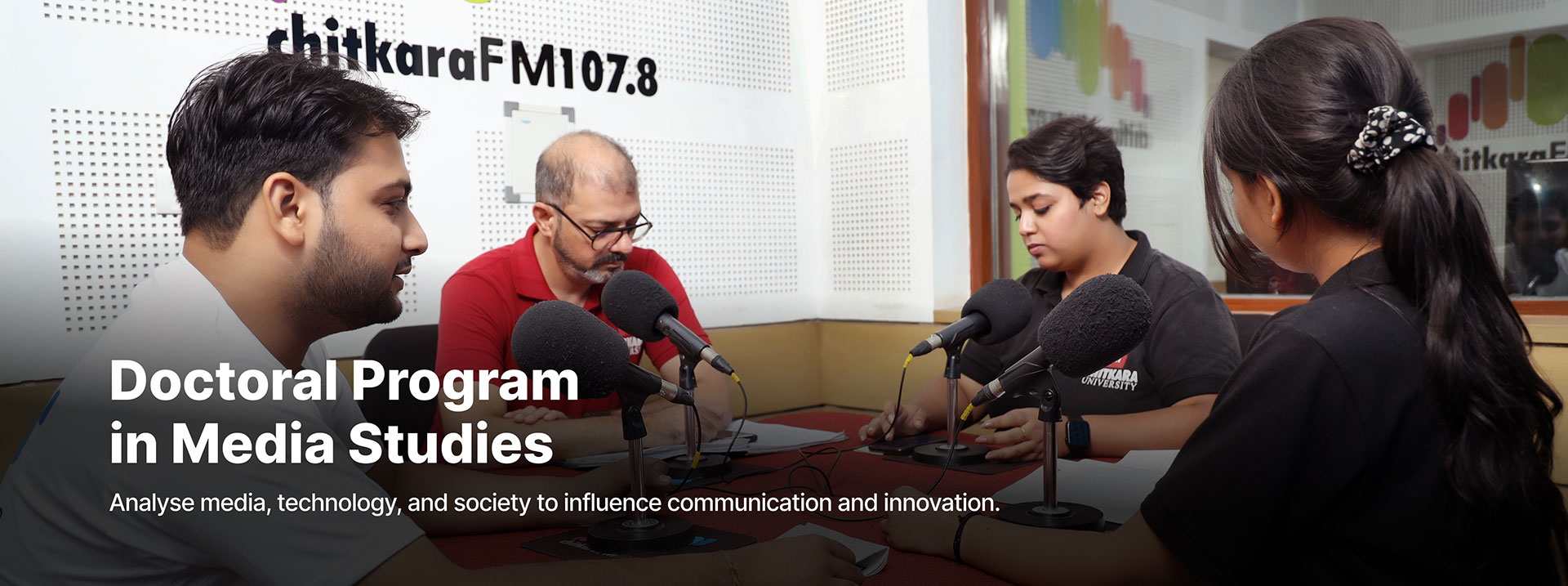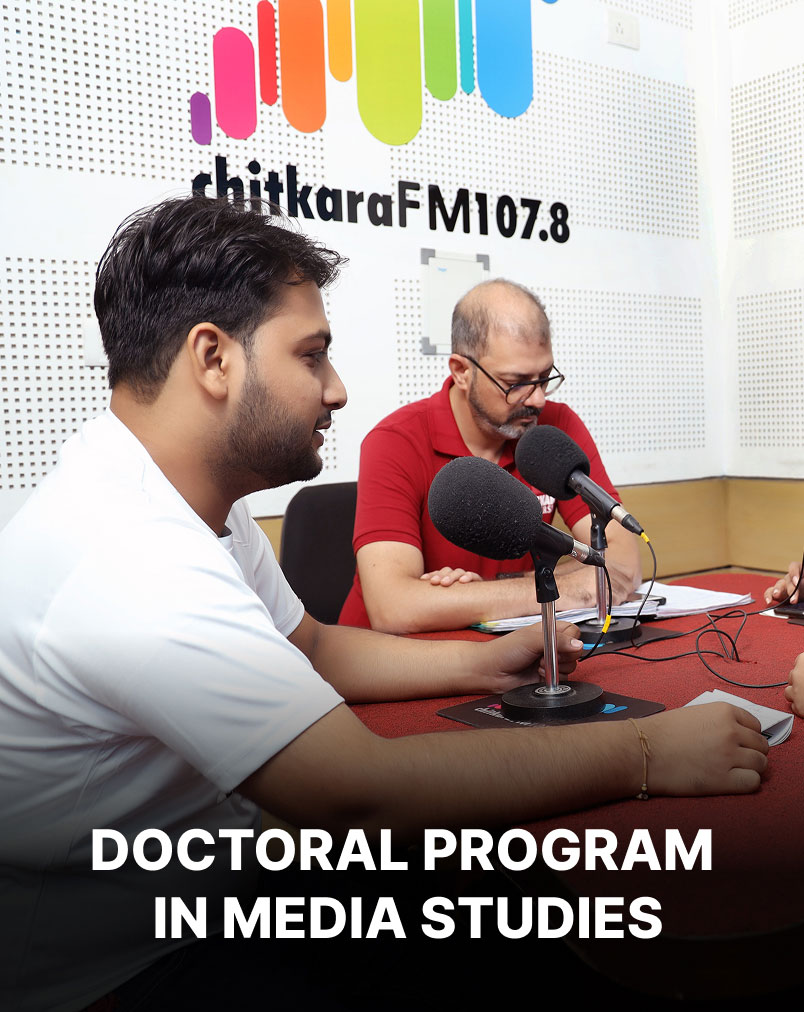PhD Program
in Media Studies
The Doctoral Program (PhD) in Media Studies at Chitkara University is designed to develop a deep understanding of the core areas and issues that are integral to the media world. Through the use of appropriate research methodologies, the program aims to produce findings that are beneficial to both academia and industry. This research will contribute to the advancement of media studies and offer valuable insights for the future of media practices.
The School boasts highly qualified and vibrant faculty members who are dedicated to providing high-quality research in various fields, including journalism and mass communication, new media, advertising, corporate communication, media laws, and the ethical aspects of the profession. The Doctoral program has been carefully crafted to align with recent advancements and developments in the media industry and postgraduate programs in mass communication. The program prepares researcher scholars for roles in higher education, media teaching, consultancy within the media industry, expertise in the field, professional practice, and policymaking, equipping them to shape the future of media. The program encourages students to critically examine the intersection of media, technology, and society, while exploring their potential to influence global media landscapes.
Be a part of India’s Top Rated University
Program Overview
The PhD program in Media Studies is one of three tracks within the Media Research and Practice doctoral program at the College of Media, Communication, and Information.
Focusing on contemporary cultural and critical theory, it examines the interactions among media institutions, content, messages, and audiences, exploring how cultural meaning is generated. The program takes an interdisciplinary approach, addressing social, economic, political, historical, legal, and international perspectives, with a focus on new communication technology and policy.
- Students work in an environment committed to critical pedagogy and intellectual engagement, ensuring a deep understanding of media theory and significant core competencies.
- Graduates develop expertise in both quantitative and qualitative methodologies, cultivating their intellectual and creative voices to contribute uniquely to the field.

What to Expect
The Ph.D program at Chitkara University will prepare you for an outstanding career in research and teaching. Right from your first semester, you’ll get to work with faculty mentors across the management field as you investigate business challenges that interest you. Our doctoral program students have the entrepreneurial ability—and diligence—to study complex issues that managers and policymakers face.
Transferrable Career Skills
Our PhD program equips scholars with skills beyond academia, preparing them for leadership, entrepreneurship, and industry roles. Through innovative pedagogy, mentoring, and hands-on learning, researchers gain critical thinking, problem-solving, and communication expertise, ensuring they excel in diverse professional landscapes beyond traditional academic settings.
Global Research Exposure
PhD students present their work at leading conferences, engaging with experts and showcasing their research on international platforms. These opportunities expand academic visibility, foster collaborations, and provide insights into emerging trends, ensuring scholars stay ahead in their fields while strengthening their professional and scholarly impact.
Student Support
Faculty mentors guide scholars through every stage of research, from idea generation to publication. Encouraged to collaborate with multiple faculty members, students gain diverse perspectives, fostering intellectual growth, refining research skills, and ensuring they navigate their academic journey with confidence and clarity.
Collaborative Research Culture
Our PhD program thrives on interdisciplinary collaboration. Working with peers, faculty, and researchers, students engage in meaningful exchanges that enhance research quality. This team-driven approach fosters innovation, accelerates discoveries, and creates an environment where collective intelligence drives impactful and pioneering research.
Admission Eligibility
The candidates who have completed any of the following qualification(s) are eligible to seek admission to the PhD program as per Chitkara University regulations and UGC Minimum Standards and Procedure for Award of PhD Degree Regulations, 2022 issued dated 07.11.2022 [(New Delhi, 7th November, 2022; No. F. 1-3/2021(QIP)].
- A 1-year/2-semester Master’s degree program in relevant discipline after a 4-year/8-semester Bachelor’s degree program or
- A 2-year/4-semester Master’s degree program in relevant discipline after a 3-year Bachelor’s degree program or
- Qualifications declared equivalent to the Master’s degree in relevant discipline by the corresponding statutory regulatory body, with at least 55% marks in aggregate or its equivalent grade in a point scale wherever grading system is followed or
- An equivalent qualification from a foreign educational institution accredited by an assessment and accreditation agency which is approved, recognised or authorised by an authority, established or incorporated under a law in its home country or any other statutory authority in that country to assess, accredit or assure quality and standards of the educational institution or
- A 4-year/8-semester Bachelor’s degree program in relevant discipline with a minimum of 75% marks in aggregate or its equivalent grade on a point scale wherever the grading system is followed, subject to the following conditions:
- The candidate should have a full-time teaching or research/industry experience of atleast 4 years.
- The candidate should be currently working in AICTE/UGC approved College/University/Government agency/industry.
Note: Relaxation for reserved categories as per UGC norms.
Program Fee Structure
| Fee Components | Amount |
|---|---|
| Enrolment Fee | Rs. 30,000/- |
| Career Advancement Services Fee | Rs. 20,000/- |
| Course Work Fee 1 | Rs. 25,000/- |
| Course Work Fee 2 | Rs. 25,000/- |
| Course Work Fee 3 | Rs. 25,000/- |
| Doctoral Seminar on Specialisation | Rs. 60,000/- |
| Research Proposal Seminar | Rs. 60,000/- |
| Progress Review Seminar 1 | Rs. 20,000/- |
| Progress Review Seminar 2 | Rs. 20,000/- |
| Progress Review Seminar 3 | Rs. 20,000/- |
| Pre-Thesis Submission | Rs. 40,000/- |
| Thesis Submission & Defence | Rs. 75,000/- |
| Total | Rs. 4,20,000/- |

How to Apply?
Candidates who fulfil the eligibility criteria, must fill the admission form with required documents of all particulars to be attached. All application forms will be screened by a separate screening committee whose representatives will be from Doctoral Research Committee and Experts from the University in the respective areas. Shortlisted candidates based on academic record and experience will appear for a written test conducted by the University.
Program Structure
The curriculum includes compulsory coursework, research proposal and objectives, research work and progress, pre-thesis work, and thesis defense.
The course work comprises of five components: research methodology, advanced research methodology, doctoral foundation seminar, doctoral concentration seminar, and research & publication ethics. After successfully completing coursework, the research scholar works in close coordination and under the strict supervision of his / her research guide, prepares the research proposal, and identifies the objectives of the research work.
Progress of the research work is reviewed every six months and finally, the scholars submit their thesis and defend it. The Doctoral Research Committee (DRC) closely mentors and monitors this process.
| Phase | Sub components | Outcome |
|---|---|---|
| Course Work | Research Methodology | Enabling scholars to purse research in a methodical manner |
| Advanced Research Methodology | Enabling scholars to know about tools and technologies to process their data | |
| Doctoral Foundation Seminar | Enabling and equipping scholars with required tools and technologies in their broad discipline area | |
| Doctoral Concentration Seminar | a) Motivation to Research, b) identification of base paper(s), c) State-of-art, d) Identification of research gaps, e) Identification of Tools/Technologies for conducting proposed research | |
| Research & Publication Ethics | Sensitisation towards research; Ethics and respect to science and research integrity; Intellectual honesty and research integrity; Scientific misconducts; Falsification, Fabrication and Plagiarism | |
| Submission of Research Proposal | Extensive literature review / patent data bases, research proposal submitted to Dean (DRC) in prescribed format | |
| Progress Seminar – I | Progress on identified research objectives | |
| Progress Seminar – II | Progress on identified research objectives | |
| Progress Seminar – III | Progress on identified research objectives | |
| Pre Thesis Seminar | Achievement of all objectives, Thesis ready in final shape, Research paper(s) communicated to Conferences / Journals | |
| Thesis Submission and Defence | Eligibility for award of Ph.D degree |
Concentrations Offered
Immerse yourself in applied high-tech research and complex topics alongside renowned faculty experts in our state-of-the-art research labs. Select from our future-focused concentrations:
- Radio and TV Journalism
- Advertising and Public Relations
- Film Studies
- Digital Media
- Print Journalism
- Photography
- Cinematography
- Corporate Communication
Framework for Phd Program
The steps you take today lay the foundation for your future success. At Chitkara University, we cultivate bright minds into changemakers, equipping them with strong fundamentals, a global perspective, and leadership skills to make a meaningful difference in the world.











